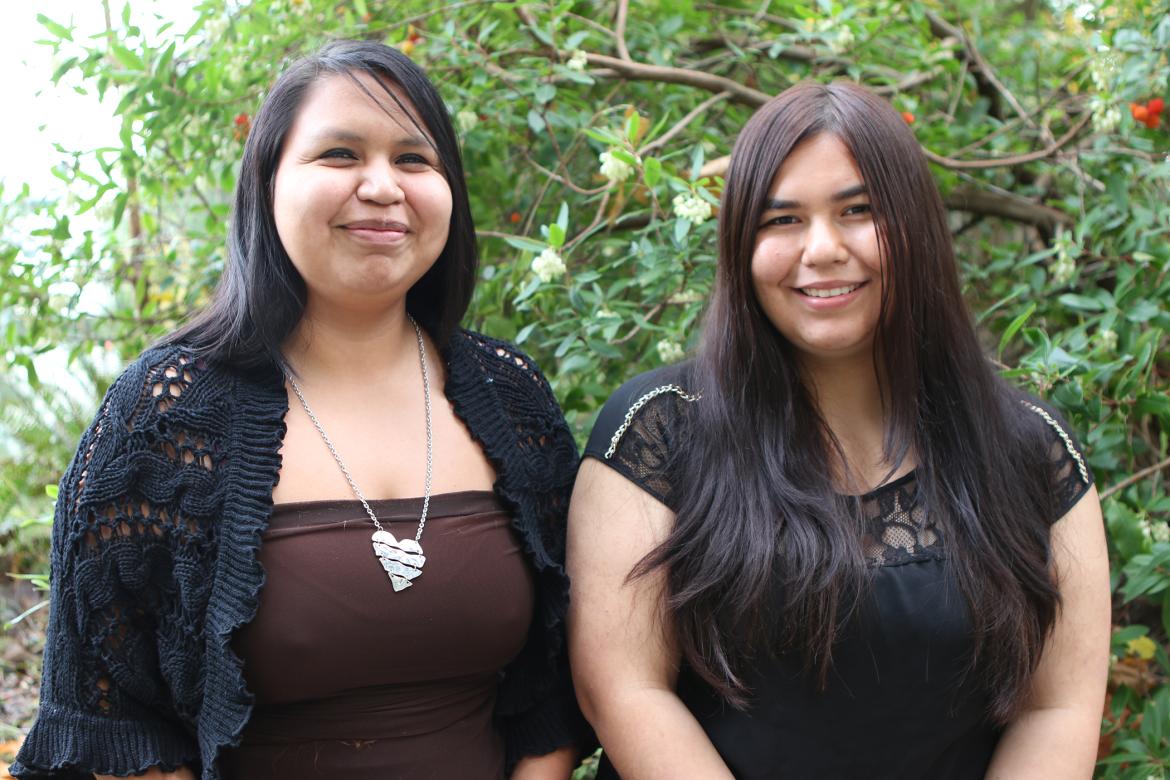
Left to right: Gladys Joe of Cowichan Tribes and Natasha Harry of Malahat Nation are among five Aboriginal youth trained as facilitators to deliver digital storytelling workshops in Vancouver Island communities.
November 20, 2014 - 1:45pm
A digital storytelling research project at Vancouver Island University (VIU) in Nanaimo changed Gladys Joe's life.
“Digital storytelling gives Aboriginal youth a voice,” says Joe, a 23-year-old member of Cowichan Tribes. “It’s a safe way to tell our stories."
Joe feels more self-confident and has learned many new skills since getting involved in the project two years ago.
She's one of five Aboriginal youth trained as mentors and research assistants to teach other youth and Elders across Vancouver Island how to use photographs and computer technology to create digital stories about topics that are important to them. Topics include healthy living, Indigenous foods, community connections, effects of colonization on food consumption and preserving traditional knowledge.
So far, the youth team has delivered workshops and presentations to more than 400 people in schools, health agencies and other organizations in Vancouver Island communities including Cowichan, Victoria, Gold River, Comox, Ahousat, Port Alberni and Tofino. More workshops are planned between now and March.
The initiative is part of a multi-year research project headed up by Dr. Jennifer Mullett of VIU’s Centre for Healthy Communities Research (CHCR) which brings together Indigenous youth and Elders from Vancouver Island communities to learn the art of digital storytelling while celebrating culture.
Dr. Mullett’s work expands on a similar project launched by Vancouver Island and Coastal Communities Indigenous Food Network in 2010, where 17 youth learned about Indigenous foods from Elders and created digital stories about healthy eating.
While evaluating that project for Health Canada, Dr. Mullett discovered “that the digital storytelling process was an effective and experiential way to create positive change. Youth involved not only ate healthier foods, they also learned computer skills, and displayed greater self-esteem and self-confidence.
"Digital storytelling technology can connect youth and Elders in remote communities, and assist Aboriginal educators in engaging youth in discussions about healthy living, says Dr. Mullett. “Creating digital stories gives youth a way to reflect,” she adds. “It provides the opportunity for them to think deeply about a topic as they tell their story.”
Dr. Mullett, co-researcher Sarah Fletcher and a team of community partners received a $145,300 grant from the Vancouver Foundation to conduct further research. Several Aboriginal youth joined the research team, and were trained to facilitate workshops and training sessions to teach more youth how to create digital stories on topics related to healthy living, life issues or points of pride in their communities.
Two-day gatherings were held in Tofino and then in Cowichan for more than 30 youth. Elders gave mini workshops about traditional foods, healing plants, smudging (a cleansing ritual) and herbal teas. “These gatherings were very special, with the Elders as mentors, and youth learning about and sharing cultural traditions, and digital storytelling,” explains Dr. Mullett.
Participants were given digital cameras to take back to their communities. They reconvened in VIU’s digital media lab a few months later for a workshop on how to use their photographs to create digital stories incorporating art, music and other special effects. Stories were broadly focused on healthy lifestyles and connection to community.
As the project evolved, Dr. Mullett and her team received additional funding from Canadian Institutes for Health Research to train more youth facilitators to lead digital storytelling workshops. Funding was also obtained for a mobile digital stories lab (a van equipped with laptops and 15 iPads) so that the youth research team can take their workshops directly to communities.
“We're especially proud of the youth involved in this project and the fact that their digital stories received an award and were honoured at the Youth Voices, Aboriginal International Film Festival in Cowichan last spring,” adds Dr. Mullett. "For the research team, it’s very satisfying when you hear participants talk about how the project has given them a voice."
Joe says the digital storytelling project gave her the opportunity to interview her 80-year-old father, learn about his cultural stories and share them with others.
“I hope I can do this kind of work for the rest of my life,” says Joe. “Sharing stories and culture through modern technology is beneficial for future generations.”
Youth facilitators will deliver a digital storytelling workshop for Cowichan Tribes Youth Centre on Nov. 27. Presentations and workshops are offered free of charge to schools, organizations and communities. To book a presentation, workshop or for more information contact project coordinator Kix Catton at 250.816.3377 or email kix.catton@viu.ca
-30-
Media Contact
Janina Stajic, Manager, Vancouver Island University
P:250.740.6288 E: Communications@viu.ca
T: @viunews
Tags: In the Community






